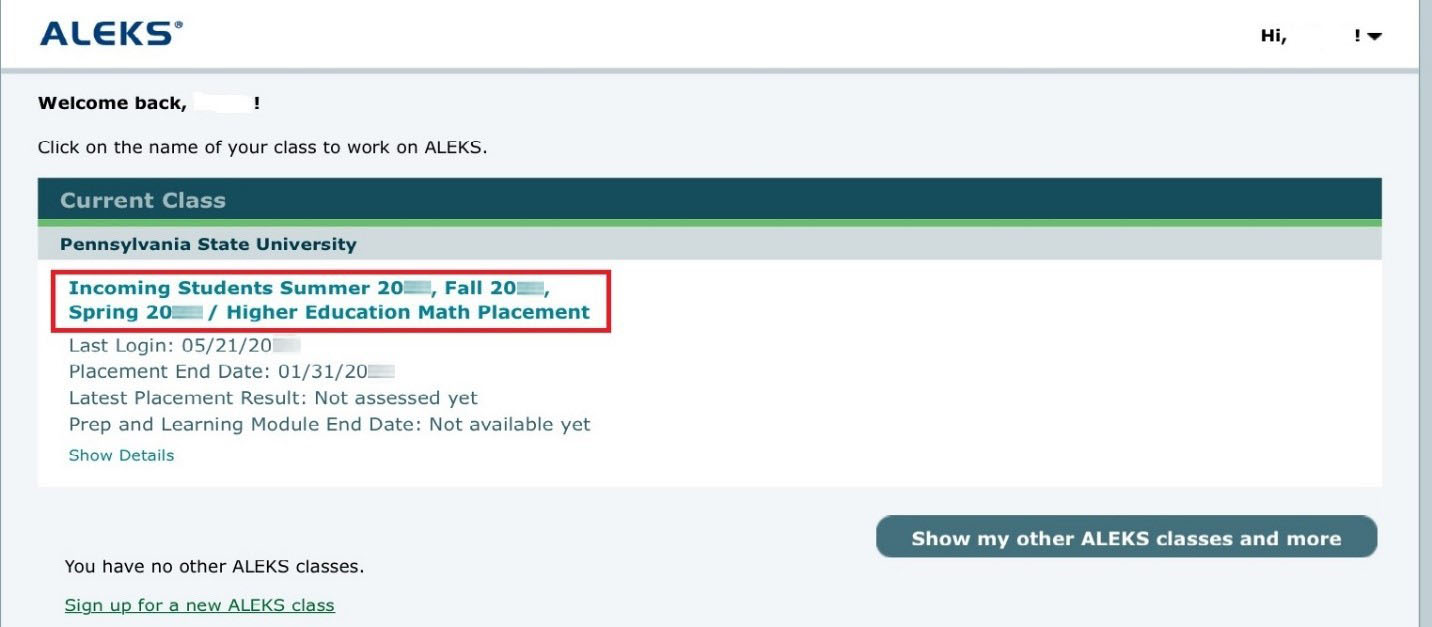ALEKS scores of 30 or higher reflect adequate preparation for college-level math. ALEKS scores cannot be interpreted in the same way as exam grades.
Course Placement Scores
You should select courses appropriate for your degree program. If your degree does not require any particular quantification course, you can meet your General Education requirement with any GQ course.
Your academic adviser will help you select appropriate courses when you are building your schedule. For first-year students, this conversation will occur at New Student Orientation. If you took calculus in high school, your ALEKS score is 101 and you should use the 76-100 column to understand your placement.

Sample problems and prerequisites for all GQ MATH courses.
You will not be permitted to take a math course that is above your readiness level (even if you are only one point away). If you want to place into a higher-level course, you may use ALEKS learning modules to practice your skills and retake the assessment.
Course placement information for English, chemistry, and world languages is in the Undergraduate Bulletin.
Programs that commonly prescribe quantification courses
| Focus of intended major | Commonly prescribed courses |
|---|---|
| Majors that focus on the sciences (e.g., biology, science education, chemistry), math, math education, or engineering |
MATH 140 (Calculus with Analytic Geometry I) CHEM 110 (Chemical Principles I) |
| Majors that focus on business (e.g., accounting, finance, marketing, economics) or information systems |
MATH 110 (Techniques of Calculus) STAT 200 (Statistics) |
| Majors that focus on communications (including advertising), social sciences (e.g., psychology, sociology, criminology), or childhood education |
STAT 200 (Statistics) Other appropriate General Education Quantification (GQ) courses selected with the help of your academic adviser |
| Majors that focus on the arts, humanities (e.g., history, philosophy, literature), or languages | You will likely not need calculus or statistics, and will select General Education Quantification (GQ) courses appropriate for your intended major with assistance from your academic adviser |
Course Registration
New first-year students are required to attend a New Student Orientation (NSO) session at their campus of admission. Students will discuss ALEKS scores, academic interests, and academic background with advisers during NSO. Advisers will help students select appropriate courses during orientation.
Transfer students and continuing students should work with their assigned academic adviser or advising center.
Practice and re-test
If you want to place into a higher-level course, you may use ALEKS learning modules to practice your skills and retake the assessment up to two additional times.
You must wait 24 hours between assessments and spend at least 10 hours actively using the learning modules before taking your second assessment. If you wish to test for a third and final time, you must invest in an additional 10 hours of practice.
Students who spend at least 15 hours in a learning module show the most improvement in their scores and a higher success in their enrolled course. Students generally improve their scores on each subsequent assessment, and 90% of students who retest move up by at least one course. The highest score is always used for placement.
To begin a learning module:
- Log on to LionPATH
-
Follow the ALEKS placement test link in LionPATH, then on click the “Incoming Students…” class to return to your ALEKS placement.

- Click the START MY PATH button to begin a learning module.
- You must complete at least 10 hours of active practice in ALEKS before a new placement assessment becomes available.
New placement scores are reflected in LionPATH the day after taking the assessment.
Need help deciding?
Your ALEKS score is used to help you start in the course where you have the best chance to succeed. If you need calculus, starting where you honestly place is the best path to success.
It is always in your best interest to improve your math skills, so you are encouraged to use the learning modules regardless of your score. If you need to consult with an adviser about your decision, email an academic adviser from your college or campus.
All access to ALEKS ends one year after your first log-in.
